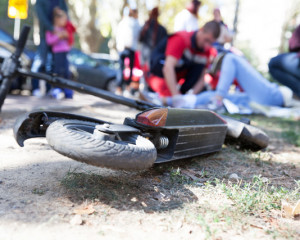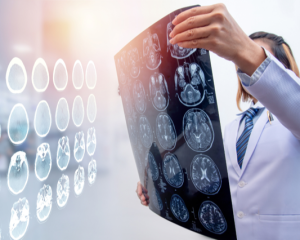Car accidents can result in a wide range of injuries. Head and brain injuries in particular can have long-term and life-altering repercussions, making them the most concerning. Following traumatic brain injuries like concussions, post-traumatic headaches are common. Even with minor head trauma and whiplash injuries, migraines are quite common following car accidents in Florida.
It remains unclear whether mild traumatic brain injuries (MTBI) can occur as a result of direct head trauma or also as the result of whiplash injuries. It is possible for some people to experience headaches right after an accident, while others may not have them for a few days or weeks. An exact cause of post-collision headaches is not easy to pinpoint. A headache's cause may not always be able to be determined by diagnostic tests like an MRI or CT scan. If you're experiencing headaches after an accident, a variety of factors may contribute depending on your situation.
Let's explore possible causes for post-traumatic headaches, other symptoms to look out for, and what to do if you're experiencing pain.
Traumatic Brain Injuries (TBI)
There are many possible causes of head pain, but a traumatic brain injury after a car crash should always be concerning. A traumatic brain injury can range from a relatively minor injury to a serious injury, depending on the circumstances. Here are some common head injuries:
- Concussions: A concussion is one of the most common types of TBI. It occurs when your brain suffers microscopic damage to blood vessels and nerves. Many people could suffer from post-concussion syndrome for months or years after a concussion.
- Contusions: During an impact, bruising on the brain at multiple locations can result from repeated blows to the brain.
- Hematomas: An intracranial hematoma occurs when blood leaks into your skull or brain from ruptured blood vessels. Bleeding can cause pressure on the brain, which is potentially life-threatening.
- Diffuse Axonal Injuries (DAI): Axons are nerve fibers that carry messages from the brain. When the brain hits your skull, the forces can stretch or rip the axons.
Headaches can be caused by any of these conditions. 90% of people with mild traumatic brain injuries suffer from post-traumatic headaches. TBIs can also cause vision problems, dizziness, memory loss, mood changes, and disorientation. If you experience any of these symptoms, seek immediate medical care.
Headaches After a Car Accident
A car accident is likely to cause head injuries because of the force involved. The brain can be injured by any blow to the head or violent shaking. Even with a lesser brain injury, you may develop a headache. In most cases, mild headaches resolve on their own without causing long-term consequences. Traumatic brain injuries, like concussions, can result in post-traumatic headaches. If you are involved in a car accident, it's important that you recognize the signs of a brain injury, as you will have to tell your doctor what you're experiencing. Pain, loss of appetite, a feeling of pressure or tightness across the forehead, back, or sides of the head, tenderness in the scalp or neck, and loss of consciousness are common symptoms of head injuries.
In 2014, there were nearly 2.9 million traumatic brain injuries in the United States, according to the Centers for Disease Control and Prevention. A concussion, the most common TBI, causes post-traumatic headaches. Not every concussion leads to post-traumatic headaches, but if you are female and have a migraine history, the risk of experiencing the symptoms increases. A post-traumatic headache occurs within a week of the injury or within 30 days of regaining consciousness. According to a study by the American Migraine Foundation, 90% of patients with traumatic brain injuries suffer from post-traumatic headaches. Brain injury without loss of consciousness is associated with a higher incidence of headache cases. However, few studies provide an explanation for this phenomenon.
As adrenaline rushes through your body after a car accident, you may believe you are fine. Afterward, you may experience pain or injuries directly related to the accident for hours or even days.
Here are some symptoms you should look for:
- A feeling of pressure or tightness across your forehead
- A dull, aching sensation in your head
- Pressure on the sides or the back of the head
- Tenderness in the neck, shoulders, or scalp.
Headaches can last as little as 30 minutes after a car accident or as long as a week. You may experience pains that come and go, or you may experience constant pain. An extended headache lasting longer than 15 days in a period of three months indicates you need medical attention for a chronic headache. Some headaches may not be serious. Experiencing acute or severe pain may be an indication of a bigger issue, such as migraines.
After a car accident, tension headaches are not uncommon due to muscle stiffness, stress, or anxiety. It could be a migraine if you develop severe headache pain, nausea, vomiting, sensitivity to light or sound, intense pain behind the ear or eye, flashing lights, or pain that makes it difficult to carry out daily tasks. In addition to tension or migraine headaches caused by car accidents, other types of headaches can arise as well, such as vascular headaches, nerve dysfunction headaches, chronic facial headaches, and musculoskeletal headaches.
What to Do If You Have a Headache after an Accident
In the event that you sustain injuries from a car accident and begin experiencing headaches shortly after the incident, it's likely that the accident caused it. What should you do?
Seek Immediate Medical Attention Immediately
As we discussed above, there are several reasons why you might suffer from constant headaches after a car accident. The only way to determine exactly what’s causing your symptoms is to seek medical care.
Perhaps you are wondering if you can go to a doctor who does not specialize in accident injuries. Family doctors and general practitioners are equipped to diagnose and treat your headache; however, personal injury doctors are experienced in dealing with cases directly related to road accidents and car accidents.
Consequently, they understand the importance of proper documentation and how to handle it. Insurance claims require the submission of such documentation. In addition, it is easier for an accident injury physician to determine whether you have suffered other injuries in the accident.
Don't Wait or “Tough it Out”
Regardless of how severe your headache is or whether it responds to over-the-counter pain medication, you don't want to ignore it especially if you've recently been in an accident. You shouldn't wait for your symptoms to clear up or go away on your own.
Follow Pain Management Treatments
Your doctor will prescribe the proper medications once you have been diagnosed. If you suffer an injury from an accident, the treatment will be different depending on your diagnosis, so don't self-medicate. In the event that you have additional questions, clarifications, or concerns, you can follow up. In the event you choose to use our medical services, we are easy to reach and approach, so you do not have to suffer pain alone.
Know Your Rights
If you have recently been involved in an accident, we can help determine how your continued headaches are related to that accident. Furthermore, your doctor will prepare all the necessary documentation that can be submitted to your insurance company or attorney. If you are entitled to compensation and rights, your lawyer can help you pursue those rights.
Diagnosing Post Trauma Headaches and Treatment
It is still not completely understood what causes post-traumatic headaches, but there are ways to confirm a diagnosis. An examination of the nervous system and a review of medical records will usually be sufficient for a doctor to diagnose. Patients with severe headaches may be referred to a specialist.
According to some theories, post-traumatic headaches are caused by the release of certain chemicals in the brain or the swelling or shrinkage of brain structures. The type of medication and duration of treatment varies according to individual needs. Patients are usually prescribed anti-inflammatories or triptans to treat migraines during the initial weeks.
Preventative drug therapy may help if post-traumatic headaches persist. Antidepressants, blood pressure pills, and seizure medication are possible treatments. A person can also benefit from biofeedback, relaxation therapy, physical therapy, and cognitive behavior modification if they want to avoid medication.
Suffering Migraines After an Accident in Florida? Contact DOCS4PI
After a wreck, headaches can begin at any time, so it's important to seek medical help immediately. Contact 1-888-DOCS4PI if you've recently been in an accident and now suffer headaches. Undiagnosed traumatic brain injuries should be treated as soon as possible. Once your doctor has discussed all your symptoms with you, he or she can provide you with a diagnosis and you can focus on getting better.





